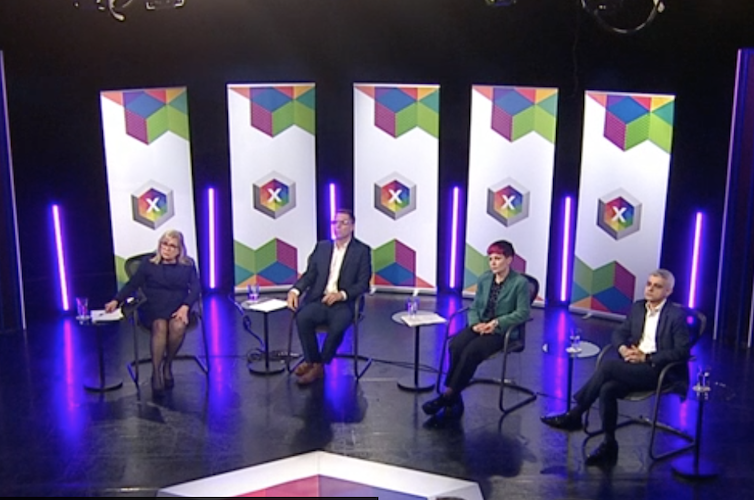With just a week to go before the election for Mayor on 2 May, dividing lines between the main City Hall contenders became clearer as they went head-to-head last night in an hour-long BBC London debate.
BBC Radio London presenter Eddie Nestor quizzed Labour incumbent Sadiq Khan and his Conservative rival Susan Hall on crime, housing and transport, the three main areas of City Hall responsibility, alongside Liberal Democrat and Green Party candidates Rob Blackie and Zoë Garbett.
The Ultra-Low Emission Zone expansion was inevitably a focus, despite the debate audience not being so sure when asked by Nestor whether it was “still a thing”.
It “absolutely was,” said Hall, a part of Khan’s “war on motorists” along with cycle lanes, Low Traffic Neighbourhoods and 20mph speed limits, which she said had left London in “gridlock”.
She repeated her promise to scrap the ULEZ expansion “on day one” along with “pay per mile” road user charging plans she claimed were still on the table despite Khan’s denials. Pay per mile was no longer needed, he said. ULEZ and other measures, such as fully electrifying the city’s buses, meant “net zero” targets would be met without it.
He would not have acted differently over ULEZ, despite ongoing controversy, he added, saying the decision to enlarge it to cover all of Greater London had been strongly influenced by the death of nine-year-old Ella Kissi-Debrah, whose death certificate was the first ever to cite air pollution as a cause. “Why should we put up with dirty air?” Khan asked. “I’m proud that lives have been extended, that there is less asthma, because of our policies.”
The Mayor also defended “active travel” measures. “Our population is growing. We’ve got to make it easier for people to walk, cycle, use public transport and drive clean cars,” he said. Was he bringing Londoners with him? “We will find out on May 2,” he replied.
On crime, hardly a hand went up when the audience was asked whether they had confidence in the Met – unsurprisingly, according to Hall. Public confidence in the police had “never been lower,” she said, blaming Khan’s “abject failure” to tackle crime over his eight-year term.
Her own big ticket £200 million investment in policing, she said, would mean 1,500 more officers, a return to “borough-based” policing, a member of her mayoral team taking a lead on tackling violence against women and girls, and metal-detecting “knife wands” issued to make stop and search less intrusive.
Blackie, whose key pledge is to “fix the Met”, went further, saying stop and search for cannabis was a “waste of time” which he would scrap completely. Police should focus on more serious crime, he said, promising a new target to double the clear-up rate for sexual offences, while challenging Hall on how her plans would be funded.
Khan said that crime was going up across the country, with cuts in policing and youth services partly to blame. Work had also started under his new Commissioner, Sir Mark Rowley, to tackle the issues undermining public confidence revealed in the 2023 Casey report, he added.
There was a personal touch too: “I could have been one of the young people who got involved in knife crime. I was raised on a council estate. My youth club saved me,” he said, pledging more support for youth services as well as a new drive to tackle crime against women and girls.
There were more dividing lines on housing. From Khan, the message was affordability, highlighting his record for meeting government targets and his promise of 40,000 new council houses and 6,000 “rent-controlled” homes, plus free advice services for private tenants, if re-elected.
Hall took a different tack: “There is one answer. More has to be built. We’ve got to build more family homes. We’ve got to get more units up because if you do that you will have more properties to sell.”
The candidates clashed as well over the London Plan, City Hall’s development blueprint for the capital, which councils have to follow when making decisions on individual planning applications.
It had too many rules, even on “how high the ceiling in your flat has to be”, said Blackie, making it harder for building to go ahead. Hall hinted that the Plan’s requirements for affordable housing quotas on larger developments were also holding back development – agreeing when Nestor suggested she “wouldn’t have a percentage”.
But “ripping up” the Plan would give developers “carte blanche”, said Khan, citing the Grenfell Tower fire as an example of what deregulation might mean. “I want high standards for all homes, and I am not going to sacrifice quality for council homes.”
Watch the BBC debate in full HERE.
X/Twitter: Charles Wright and OnLondon. Support OnLondon.co.uk and its writers for just £5 a month or £50 a year and get things for your money too. Details HERE.

